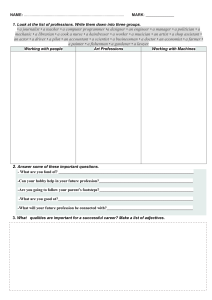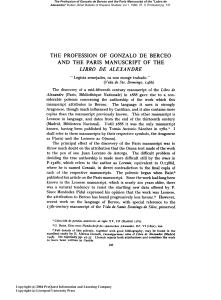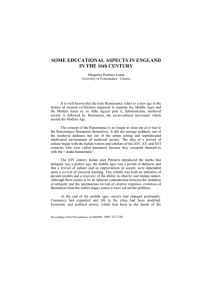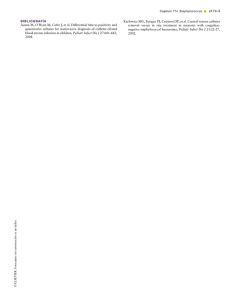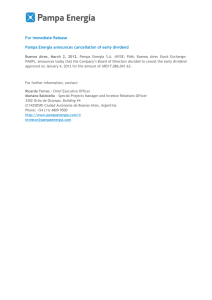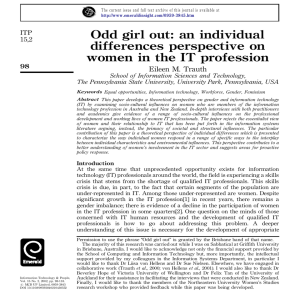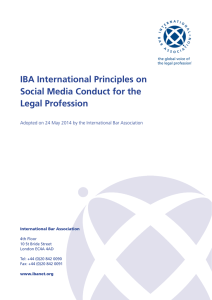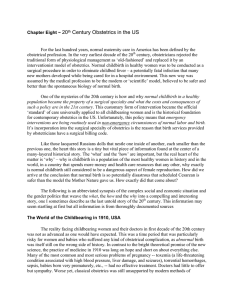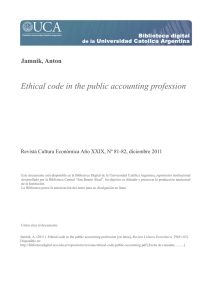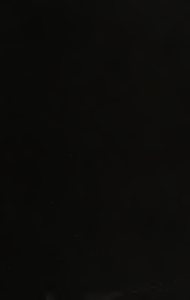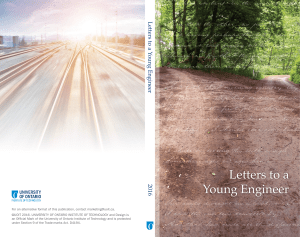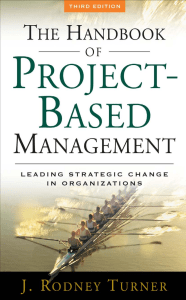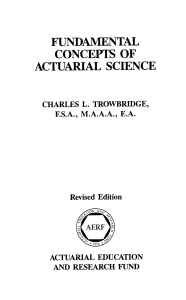The road towards a more humane medicine
Anuncio
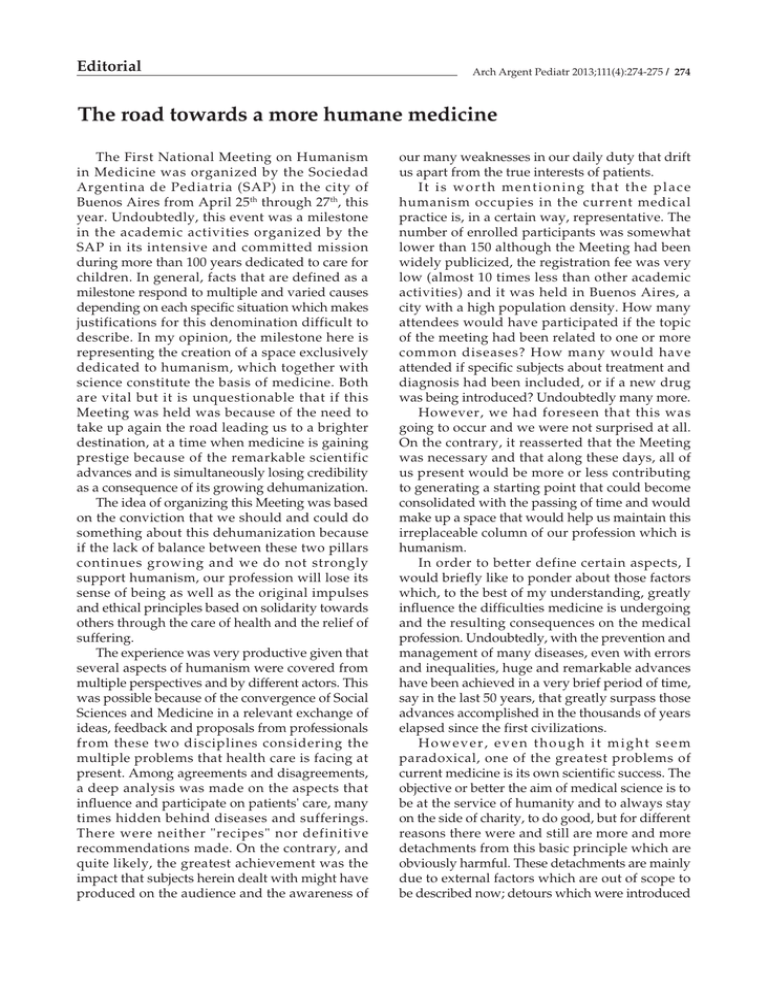
Editorial Arch Argent Pediatr 2013;111(4):274-275 / 274 The road towards a more humane medicine The First National Meeting on Humanism in Medicine was organized by the Sociedad Argentina de Pediatria (SAP) in the city of Buenos Aires from April 25th through 27th, this year. Undoubtedly, this event was a milestone in the academic activities organized by the SAP in its intensive and committed mission during more than 100 years dedicated to care for children. In general, facts that are defined as a milestone respond to multiple and varied causes depending on each specific situation which makes justifications for this denomination difficult to describe. In my opinion, the milestone here is representing the creation of a space exclusively dedicated to humanism, which together with science constitute the basis of medicine. Both are vital but it is unquestionable that if this Meeting was held was because of the need to take up again the road leading us to a brighter destination, at a time when medicine is gaining prestige because of the remarkable scientific advances and is simultaneously losing credibility as a consequence of its growing dehumanization. The idea of organizing this Meeting was based on the conviction that we should and could do something about this dehumanization because if the lack of balance between these two pillars continues growing and we do not strongly support humanism, our profession will lose its sense of being as well as the original impulses and ethical principles based on solidarity towards others through the care of health and the relief of suffering. The experience was very productive given that several aspects of humanism were covered from multiple perspectives and by different actors. This was possible because of the convergence of Social Sciences and Medicine in a relevant exchange of ideas, feedback and proposals from professionals from these two disciplines considering the multiple problems that health care is facing at present. Among agreements and disagreements, a deep analysis was made on the aspects that influence and participate on patients' care, many times hidden behind diseases and sufferings. There were neither "recipes" nor definitive recommendations made. On the contrary, and quite likely, the greatest achievement was the impact that subjects herein dealt with might have produced on the audience and the awareness of our many weaknesses in our daily duty that drift us apart from the true interests of patients. It is worth mentioning that the place humanism occupies in the current medical practice is, in a certain way, representative. The number of enrolled participants was somewhat lower than 150 although the Meeting had been widely publicized, the registration fee was very low (almost 10 times less than other academic activities) and it was held in Buenos Aires, a city with a high population density. How many attendees would have participated if the topic of the meeting had been related to one or more common diseases? How many would have attended if specific subjects about treatment and diagnosis had been included, or if a new drug was being introduced? Undoubtedly many more. However, we had foreseen that this was going to occur and we were not surprised at all. On the contrary, it reasserted that the Meeting was necessary and that along these days, all of us present would be more or less contributing to generating a starting point that could become consolidated with the passing of time and would make up a space that would help us maintain this irreplaceable column of our profession which is humanism. In order to better define certain aspects, I would briefly like to ponder about those factors which, to the best of my understanding, greatly influence the difficulties medicine is undergoing and the resulting consequences on the medical profession. Undoubtedly, with the prevention and management of many diseases, even with errors and inequalities, huge and remarkable advances have been achieved in a very brief period of time, say in the last 50 years, that greatly surpass those advances accomplished in the thousands of years elapsed since the first civilizations. However, even though it might seem paradoxical, one of the greatest problems of current medicine is its own scientific success. The objective or better the aim of medical science is to be at the service of humanity and to always stay on the side of charity, to do good, but for different reasons there were and still are more and more detachments from this basic principle which are obviously harmful. These detachments are mainly due to external factors which are out of scope to be described now; detours which were introduced Editorial / Arch Argent Pediatr 2013;111(3):274-275 / 275 in medicine and brought about not so promising consequences for the population and physicians. In this process of overwhelming advance of science and technology it seems to be difficult to tell the difference between what is good and what is bad and to follow at all times the correct course. Success can dazzle many and give rise to the conviction that the most important thing, or almost the only important thing, in medicine is scientific knowledge; this way, little by little, the other essential principles of our profession based on the human relationship with patients and on taking care of their interests are getting lost. The German philosopher Hans Jonas, in his excellent assays about ethical errors of contemporary medicine, underlined the apparent success that the overwhelming scientific progress had, together with the technological "invasion" and its inadequate use among the causes. Likewise, he stressed that it is necessary to become aware and be more careful when the effectiveness of an alleged advance or new technology offers immediate benefits. The future problems are more related to success than to failure, hence it is critical to always weigh potential risks, given that damage can be irreparable. We should fear more our power than our impotence, and when facing uncertainty we should always act with caution and humbleness. The above mentioned aspects and others resulted in enormous changes in medicine, which as of the 19th Century began to be considered as a more serious profession, a time when physicians became aware that they knew very little and that the treatments they prescribed were more harmful than beneficial. This brought about the development of a more humane medicine by understanding that the most important aspect was the accompaniment of patients with help and consolation of their sorrows. Physicians gained respect and were able to obtain people's trust, an essential element in every human relationship, achieving a huge recognition from society. So the ancient principles of our profession were reborn, something that was very well portrayed by the French philosopher Michel Foucault, in his book The Birth of the Clinic, where he states "What was fundamentally invisible suddenly offered to the brightness of the gaze... It is as if for the first time for thousands of years, doctors, free at last of theories and chimeras, agreed to approach the object of their experience with the purity of an unprejudiced gaze." It is certain that such momentum diminished significantly, especially after the Second World War when everything changed and the world was never the same. We should accept that changes are inexorable and will continue being present, to a lesser or greater extent, in the life of human beings. However, we doctors have to wonder why these changes might overshadow or leave behind the essential goals of medicine that are not only based on the scientific aspects but also on maintaining other principles without which we would lose our greatest virtue. I want to clear out, so as to avoid misunderstandings, that undoubtedly scientific aspects are essential, patients want us to be qualified and have enough knowledge and proper clinical judgment to know what they are undergoing, but they also want us to listen, to be aware of their doubts and fears, to help them when their health is compromised, to support them; in short, that we are by their side. The latter cannot be learnt from books, but it can be developed and thus applied to daily practice. Gianantonio, our ever-present teacher, taught us that all medical procedures, even the simplest one, imply an ethical attitude which is absolutely inseparable from scientific knowledge. The above described aspects show us the way to a more humane medicine that can only be built based on what each of us can do to reach this aim. We do not have to wait for others to do it nor to expect significant changes to occur in the medical profession that will improve the situation. Patients will always want that we have an empathetic attitude towards them and the commitment to help them; it is our duty not to let them down.n José M. Ceriani Cernadas Editor http://dx.doi.org/10.5546/aap.2013.274
